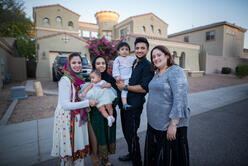Umeeda Shalizi, 23, gives the impression that she’s going places and that she will not be hindered by the places she’s been.
Umeeda was born in a refugee camp in Pakistan. Her family returned to Afghanistan, her parents’ home country, when she was about 10. Umeeda, her siblings and her mother made a desperate return to Pakistan some years later after her father disappeared.
Umeeda, alongside her mother and five siblings, resettled in Phoenix in 2018. Arriving in a new country was initially disorienting for her. “It was a completely new place for me. New people, new language, a new culture. Everything like … I had a lot of problems. I couldn’t understand the people,” said Umeeda.
However, Umeeda worked to build the life she wanted here in the United States. Her initial dreams were to buy a car and a house for her family.

“Even though she was new in the country, she had goals,” said Elnaz Bourbour, asset-building coordinator for the International Rescue Committee (IRC) in Phoenix. The IRC programs managed by Elnaz are designed to help immigrants meet financial goals through financial coaching, credit-building, consumer lending, and matched savings. Last year, 271 refugees and immigrants were served through the Asset Building Program.
The Asset Building Program requires drive and determination, both of which Umeeda demonstrated. “She was very eager to work hard. She was so independent, providing for her family and working full-time.” Elnaz said.
Under the asset building program, Umeeda and her mother saved $4,000 in a few months. The IRC matched it through a grant provided by Wells Fargo. That meant Umeeda had $8,000, which she used to purchase a 2006 van. Umeeda learned to drive and then taught her mother.
“After that, we focused on her credit through our credit-building program,” Elnaz said. In this program, refugees are given small loans and then pay them back, which improves their credit history. Usually, the program allows the immigrants to establish credit scores around 650. Umeeda’s score is much higher – in the “excellent” range. “That’s amazing because not all of our clients can get there that fast,” Elnaz said.

Now, with the IRC’s help, Umeeda and her mother are in a six-month program to get money for the down-payment on a house. Elnaz said Umeeda was disappointed that the family would have to wait six months. She expected to be ready sooner. If all goes well, the family will be in a four-bedroom house by the end of 2020.
“We’re living in an apartment. It’s a two-room,” she said. “We can’t live in an apartment all our lives. The money that we are paying for an apartment we can pay for a house and it can be ours one day.”
When she says she wants to buy her own house, she’s looking beyond the immediate goal of getting a place for her family. “I want to buy a house now for my mom. One of my big goals is to have my own house,” Umeeda said.
Beyond home ownership, Umeeda also dreams of continuing her education and advancing her career. Umeeda currently works at a bakery and has been able to maintain work despite the pandemic. “I want to go to college, get my GED, get a better job and buy my own house,” Umeeda said. “I want to get a better job. I want to be a nurse in a hospital.”
Umeeda recognizes that the support she gets from the IRC in Phoenix is invaluable. She said it would take her much longer to reach her goals without the help. “Maybe I would [have waited] a long time to get more money,” she said. “IRC is a big help to us.”
Support for the IRC Asset Building Program comes from a grant provided by Wells Fargo. "Thank you to Wells Fargo for their support of this program. With their help, we've been able to help hundreds of refugees pursue their financial goals," said Elnaz.
Story by Dennis Godfrey, IRC Volunteer.